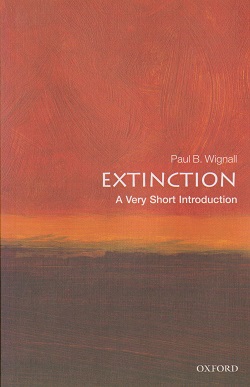Extinction: A Very Short Introduction
 Hardly a week goes by without a reminder on the news of yet another hapless species on the brink. Occasionally, as with the Northern White Rhino, it is more than just a close call. But surprisingly, the idea of extinction is something relatively new that developed alongside evolutionary theory two centuries ago. And much like its sibling in science, what seems straightforward in concept is in reality complex and fertile ground for rigorous debate.
Hardly a week goes by without a reminder on the news of yet another hapless species on the brink. Occasionally, as with the Northern White Rhino, it is more than just a close call. But surprisingly, the idea of extinction is something relatively new that developed alongside evolutionary theory two centuries ago. And much like its sibling in science, what seems straightforward in concept is in reality complex and fertile ground for rigorous debate.
Wignall introduces us to the points of debate and outlines the key areas of the science. As with any work related to the geological record, gaps and inconsistencies lead to rival ideas. The demise of the dinosaurs is a good example of this. The Alavarez meteorite hypothesis introduced in 1980 did not gain full acceptance for several decades until further more detailed work confirmed it. Now the K-T boundary site in Gubbio, Italy is something of a Mecca for palaeontologists.
The issues around measuring extinction are mainly statistical and Wignall covers these brilliantly with clear diagrams and illustrations. This does not detract from the overall feeling of shame at the scale of destruction that humanity has wrought upon the organisms we share our planet with. The only good news is that when compared to the greatest extinctions our planet has ever seen, we still fall somewhat short of the mark (maybe). With enough time and money perhaps the efforts of conservation and climate change mitigation can prevent us claiming the title of largest mass extinction from the Permo-Triassic event.
But in case conservation isn’t your thing and you ever feel the need to wipe out life on our humble little planet, the aptly titled chapter “How to kill nearly everything” should prove a handy guide. From meteorites to climate change, the potential devices of mass extinction are numerous. They can also hide themselves surprisingly well in the geological record. Even as recently as the Pleistocene, large animals have been disappearing en masse without an obvious culprit. The case for blaming humans is examined in the final chapter, along with our lack of close relatives.
Wignall has made this Very Short Introduction an accessible and fascinating read, with well selected figures and chapter topics. Those familiar with the topic of extinction are bound to discover something new here and those less well versed will find themselves questioning their very understanding of the word.
Reviewed by Jonathan Scafidi
EXTINCTION: A VERY SHORT INTRODUCTION by PAUL B. WIGNALL, 2019. Published by Oxford University Press 124pp (pbk) ISBN: 9780189807285 List Price: £8.99 W: https://global.oup.com/academic/product/extinction-a-very-short-introduction-9780198807285?cc=gb&lang=en&